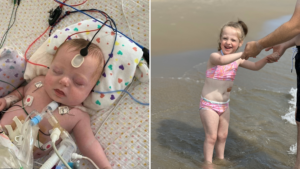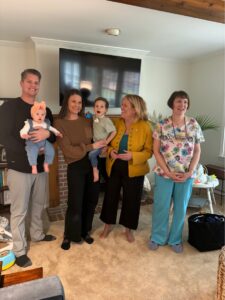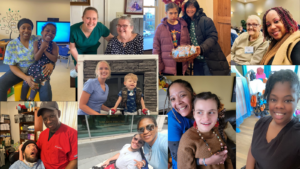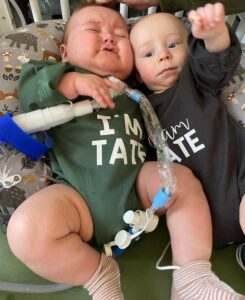May is Better Speech and Hearing month and we would like to celebrate how our Hearts for Home Care advocates, Mark Steidl and Ari Anderson have never let their diagnoses stand in the way of making their voices heard. They are an inspiration to so many of their peers and fellow advocates ─ stopping at nothing to help and improve the lives of medically complex individuals who rely on home care to keep them cared for and safe.
Mark Steidl, from Pittsburgh, PA, doesn’t let communication challenges stop him from sharing his story with legislators. Diagnosed with Cerebral Palsy, he uses a Dynavox communication device to educate lawmakers on the importance of home care and the impact his home health aides and nurses have had on him. Mark operates the device by using the switches that are affixed to his wheelchair at either side of his head. The Dynavox allows Mark to type out what he wants to say, and then the device’s speakers enable Mark to communicate out loud.
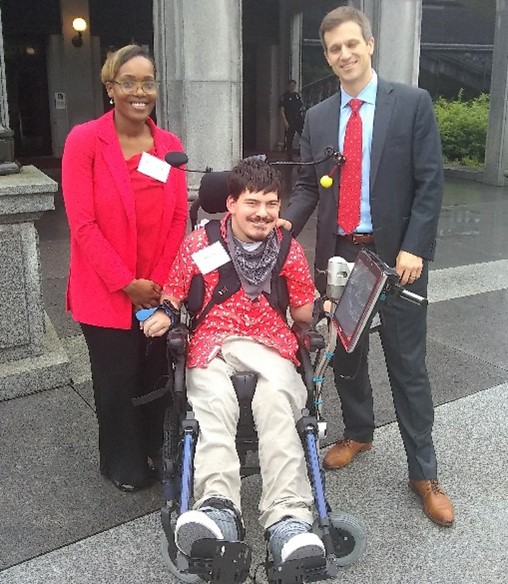
Mark and his mother travel to the state capitol in Harrisburg, and to Washington, D.C. at least once a year to take part in Hearts for Home Care lobby days — days in which dozens of advocates gather to make meetings with legislators that will be voting on home care-specific legislation.
In a conversation with Mark about his advocacy work, he said, “Thirty years ago – before the advent of electronic communication devices, I would not have been able to communicate with you. If I had been born in 1965 instead of 1995, my parents might have been told to send me to an institution instead of raising me at home with all the support I need. Times have really changed. Advocacy and new ways of thinking have created those changes. But much more needs to be done and much more can be done. We have to keep advocating for the changes and the opportunities we want.”
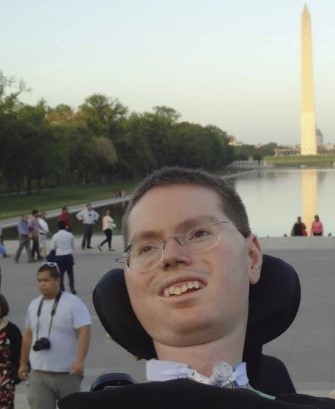
Ari Anderson, from Charlotte NC, truly understands the importance his home care nurses have had on his life, and because of this, dedicates his life to advocating for them and the other individuals who benefit from their care: “My nurses have provided me with life-sustaining care,” he says. “Most die from [Spinal muscular atrophy] SMA type 1 by age 2.” Ari was diagnosed with SMA Type I at 6 months of age. 38 years later, thanks to his dedicated nurses, new technologies, and medical therapies he is living his life healthy and independently at home.
With the help of his communication device, Ari has become a passionate advocate, inspiring all who meet him. His team of highly skilled nurses has also enabled him to graduate from high school, receive his bachelor’s degree, and earn a master’s certificate in technical writing. He now authors a column for SMA News Today and dedicates much of his time to advocating for home care and educating the public on its value. Most recently, using his communication device and eye-gazing technology, Ari brilliantly crafted a video he uses to educate North Carolina legislators about the impact of home nursing.
For Ari, skilled home care nursing has long-been a lifeline that has allowed him to grow up and thrive despite his prognosis. Most importantly, it has enabled him to be where he wants to be: at home.
Both Mark and Ari rely on skilled in-home caregivers to remain safe and cared for surrounded by their families at home. Like Mark says, the American healthcare system has changed and high-quality care at home is becoming the new norm as families and their loved ones choose home care over long-term care and nursing facilities. Lower costs of care and preventable hospitalizations are just two of the many reasons that home nursing care is optimal for the state and its residents.
However, skilled home nursing programs are state funded by Medicaid and the reimbursement rates given to providers are not enough to keep up with the competitive wages hospitals and long-term care facilities are able to offer. Without competitive wages, providers are struggling to attract qualified nurses to the industry, thus leaving medically complex individuals like Mark and Ari at risk without care. Our advocates are urging state legislators to invest in home care and raise reimbursement rates ─ as the future of our healthcare system is in the home.
Join the Movement
Mark and Ari are super-advocates who are inspiring those around them to make their voices heard. For ways you can advocate for yourself, your loved ones, and your community at-large, please email [email protected].

